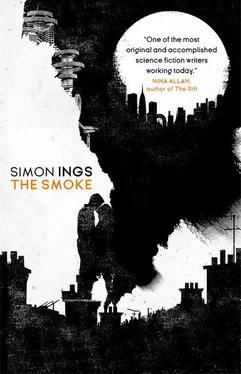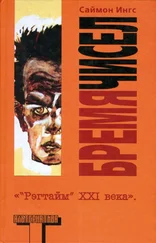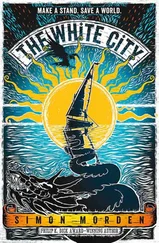At night we tore into each other the way a starved cat tears at a bird.
Fel gave herself a hard time, always. She never took her brilliance for granted. She was conscientious. She never took her body for granted, either, moving with an oiled slickness that suggested the expert operation of a complex mechanical system. When she reached orgasm, she laughed, and while her happiness was evident, at the same time her climaxes were not a release for her, nor any hackneyed falling back into self. She was energetic afterwards, elated, as though together we had enabled her body to accomplish a new thing.
It was a part of Fel’s heritage that she was insatiably curious about all kinds of processed food and unfamiliar tastes. Dog treats. Mealworms. Cans of winter melon tea and pressed fish roe. Though she agonised over it, interrogated it, poked it and pilloried it often, she ate virtually everything. Bacon. Black pudding. Growing up on the Bund’s peculiar, delicate and by and large processed diet, she was fascinated by the rawness and bloodiness of my own meals. Once I cooked her some steak, and she grinned and chewed and slobbered and enthused right up to the point where she was violently sick just a couple of feet short of our toilet.
She thought in ways that were studied and contrarian. She treated other people’s opinions the way a fox treats an unsecured bin. She gave herself no quarter; she said, ‘The way I’ve been taught, I tear everything down to white light.’ Until she said that, it had never occurred to me that, young as she was, she might actually have finished her education, and been given mastery over all the tools she would ever need.
Towards Christmas in my second year, Fel decided it was ridiculous, me having to commute from Tooting to the Cripplegate site every day. ‘There’s too much going on. You’ve too much to worry about. It’s going to drive you crazy,’ she said. ‘Leave it with me.’
The next evening she turned up at the Tooting house dangling a set of keys in my face. She said, ‘Daddy says we should move in together.’
‘Well.’ I thought about it. At least, I made a good show of thinking about it. ‘Daddy knows best, I suppose.’
* * *
‘Is this Georgy’s?’ I asked, moving as if in a dream from one large, airy, day-bright room of the Barbican flat to the next.
‘One of them,’ Fel replied. ‘It’s not a place I know.’
‘Why is he doing this for us?’
She came and stood by me and we gazed out through the patio door at the water and the strong, brutal lines of the buildings. Sunlight against brick and cement render. ‘He’s going to have to accept what I want,’ she said. ‘And I want you.’
Kissing me, putting her arms around me, sliding her tongue into my mouth, she stopped me from formulating the obvious question: whether her father had asked her for anything in return.
My Tooting housemates helped us pack and made us promise to come back and visit, but we never did. I was sorry to lose that easy, effortlessly decent community in Tooting. Looking back, I can see that I was at my happiest there, and at my best.
But love will have its day. I imagined I was surfing with Fel through new territories. (‘Surfing.’ This is what she called the business of acquiring information.) Books. Music. She played me Wagner, Mozart, Schumann. We read poetry aloud to each other in bed. Cavafy. Keats. Eventually it would come to me that I was not ‘surfing’ anything; that I was simply wallowing along in her wake. In the meantime I was drunk on her difference. The weird flexibility of her limbs. Her scrawny strength.
‘We frontload our health,’ she told me once, in bed. I sucked on her tit as she spoke for the Bund. ‘Many of us go blind before we die.’
* * *
Fel had time for Stella’s TV show. I didn’t. The spring term of my second year ended with important exams. In the end, in a desperate bid to balance favours for Stella with my course requirements, I persuaded my tutors to grant me a placement at her studio, so that I could design the interiors she needed and have that count towards my qualification. Submarine. Moonbase. Moon interceptor. Tank-like ‘mobiles’. The subterranean offices of DARE’s Shepperton HQ. I sold it to the Bartlett as an opportunity to design for the new fabrication machines spilling out of Medicine City. I showed them Fel’s open-weave exoskeleton-cum-jumpsuit, in both its fabric and wire versions, and I explained I wanted to accomplish equivalent innovations in the built environment. I used expressions like ‘built environment’. They gave me six weeks and expected me to write them a 30,000-word dissertation about the experience.
Because Georgy Chernoy’s personal worth was astronomical, it was easy to forget that Stella was a commercial success in her own right. She owned a house in Islington and a holiday cottage in Shropshire, to which she used to repair whenever she had a script to work on. When she heard about my dissertation deadline, Stella gave me the key and told me to top up the oil tank, keep the dehumidifier running in the master bedroom, and otherwise do with the place as I liked.
As if holing herself away in an old crofter’s cottage at the edge of a village just shy of four hundred souls was not isolation enough, Stella had had a hut built at the top of her garden. The garden ran all the way up the hill behind the house. Though the property deeds presumably marked a border, in truth it was possible to walk all the way up through the garden, past two handkerchief-sized lawns, past gooseberry and blackcurrant bushes, and a terrace barely big enough for a set of rusting garden furniture, up more steps to the hut, and beyond, into trees, and out again to a view all the way to Wales, and there imagine that the entire Clun Valley was one’s own.
I took an extended Easter break there. On my first night, I woke up at about 4 a.m. to an unfamiliar chill and could not get back to sleep. I went downstairs, made coffee in one of Stella’s several coffee makers, fetched the key from beside the back door and carried my drawing equipment up to the hut along bark trails and flagstone paths treacherous with moss and lichen and dew. The hut was small, watertight, and the bottled gas heater warmed it up in minutes. There was a chair and a tilting table large enough for me to draw on. It became a routine. I started work before dawn, finished around eleven and spent the rest of the day either walking in the surrounding countryside or tending the garden.
It took me about a week to shake off the persistent feeling that I was working on DARE out of weakness – an inability to say no to my aunt when she needed a cheap favour. By the end of the second week I was obsessed. I spent evenings on the phone to Stella and to Fel, arguing for more budget, better materials, more ambitious sets. I drew ceaselessly, inspired by the scripts I had read the night before. These arrived almost daily. The series, originally planned at six episodes, was now budgeted to run for twenty. Our available funds were increased, but I still had to design sets that were more convincing, more sturdy and more easily mended for less money per unit of screen time.
Strong colours and extensive lighting notes replaced expensive materials. The moonbase grew airier, lighter and less cluttered, the submarine even more of a human sardine can. Only a skeleton staff remained to operate DARE’s subterranean HQ.
Though she brought in friends to help with the dialogue, Stella wrote the additional storylines herself. Under the pressure of extra work, the scripts, though crude, were acquiring a distinctive flavour – an urgency and coherence the original episodes had lacked. Whether by accident or design, Stella’s notion – that the world has room for more than one future – began to be realised. The show’s inconsistencies, its departures from reality, no longer bothered me. I began to inhabit the world of the show. In my mind, it ceased to be a drama about underdressed people in space. It ceased to be a show that deliberately, wilfully ignored the Bund, the chickies, or the half-dozen other human variants that rub more or less uncomfortably against each other upon this crowded and irradiated Earth.
Читать дальше












